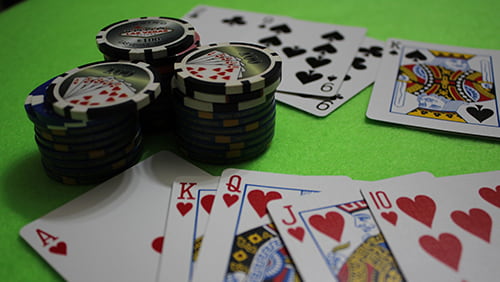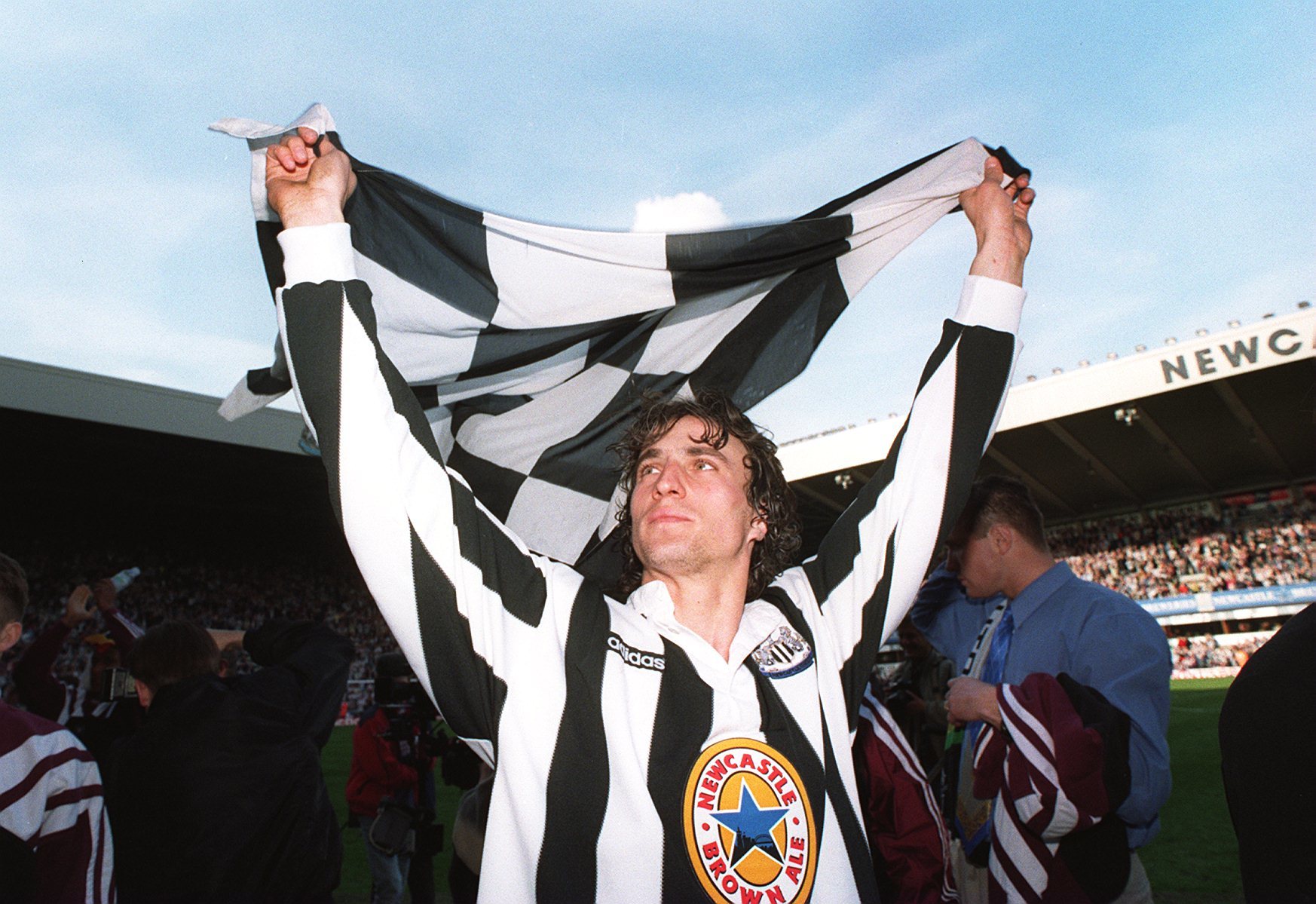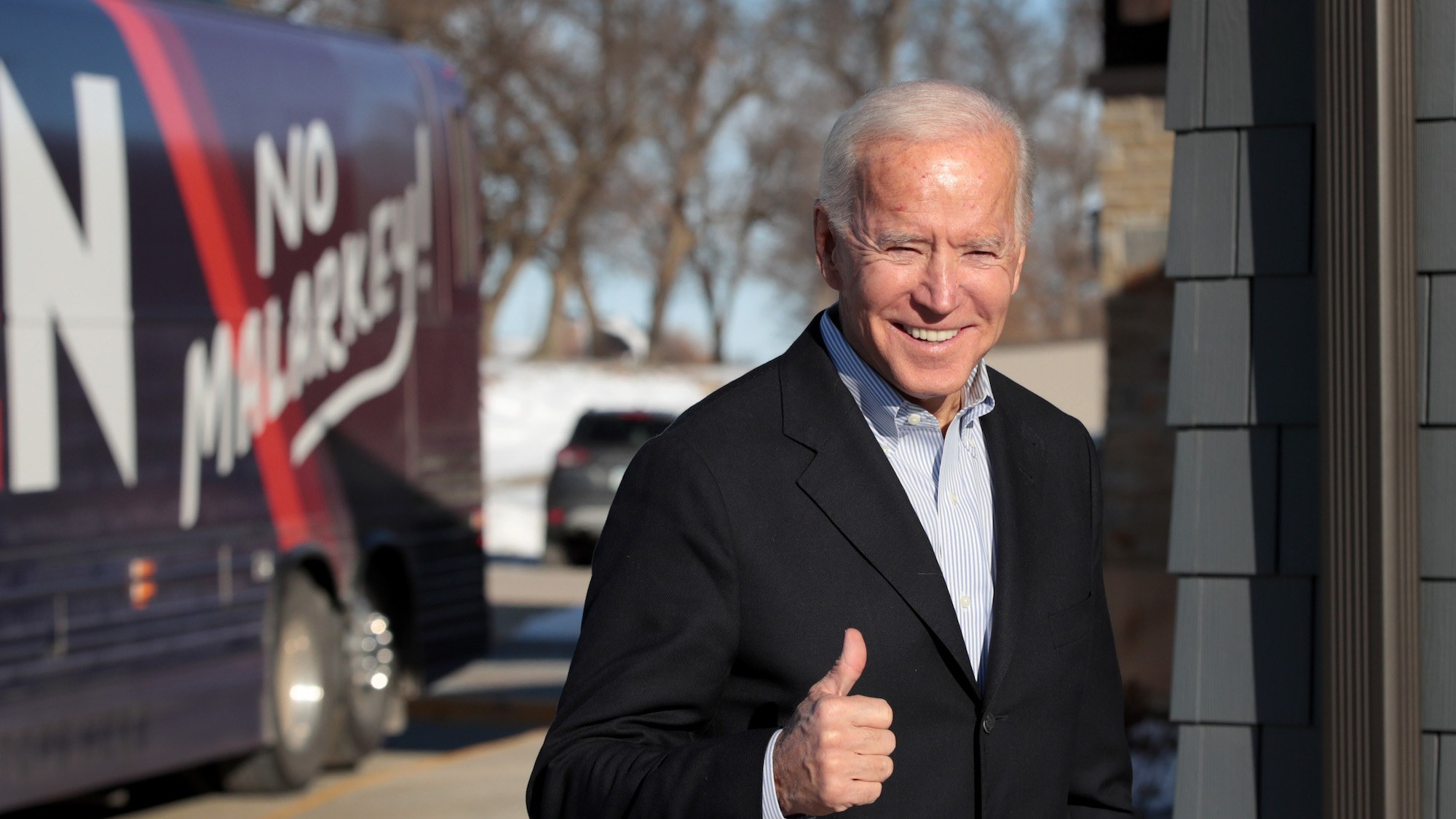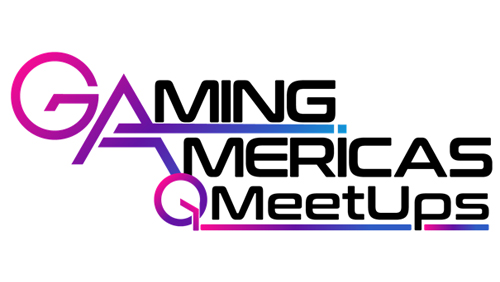The son of Bodemeister won the 2020 Clark Stakes (G1) on his way to earning $694,600.
Monthly Archives: January 2021
Four Wheel Drive Sold to Stand in Japan
Four Wheel Drive, a son of American Pharoah and winner of the Breeders’ Cup Juvenile Turf Sprint (G2T), was bought by the Thoroughbred Breeders Club in Monbetsu, Hokkaido.
Buyer Traffic Steady Ahead of OBS Winter Mixed Sale
Ocala Breeders’ Sales will raise the curtain on its 2021 season with the Winter Mixed Sale Jan. 26-27. Despite the uncertainty brought on by COVID-19, horsemen remain optimistic ahead of the auction which kicks off Tuesday at 10 a.m. ET.
Veteran Sire Surf Cat Relocated to Rancho San Miguel
Veteran stallion Surf Cat, a multiple grade 2 winner and grade 1-placed millionaire and the sire of multiple California-bred champion Sircat Sally, will stand at Rancho San Miguel near San Miguel, Calif., during the 2021 breeding season.

Midweek Premier League preview
After a tumultuous weekend in the F.A. Cup, Frank Lampard lost his role as Chelsea manager, the holders Arsenal were knocked out and Liverpool suffered another defeat, this time at the hands of their bitter rivals, Manchester United.
With the Premier League returning in midweek with a full programme of 10 fixtures, which sides will be looking to move up the table and which others will be glancing over their shoulders nervously?
West Bromwich Albion vs. Manchester City (Tuesday, 8.15pm GMT kick-off)
A tricky tie for Pep Guardiola’s Manchester City side, not least because Kevin De Bruyne will miss the game after a hamstring problem sent the Belgian assist machine to the injury room at the Eithad for between four and six weeks.

Australian Open men’s tennis sportsbetting preview
A delayed start, quarantine regulations and COVID-19 restrictions – just how was anyone supposed to prepare for the Men’s Singles at the Australian Open properly?
From the pundits to the players, the fans to the financiers and the advertisers to the organisers, putting on this year’s Australian Open has been a Herculean effort worthy of commendation. But with players forced to quarantine for a fortnight, many of the world’s best tennis players have found cause for complaint.
Unsurprisingly, one of those is world number one Novak Djokovic, whose 305th week at the top of the men’s tennis rankings was spent calling out the AO for the condition players have been forced to isolate in. Living in their hotel rooms, players such as Djokovic have not been happy, but disharmony isn’t helping anyone.
Djokovic said in his letter to the AO on Twitter that “better conditions” were needed for players in Melbourne and kicked back against those accusing him of wanting COVID-19 restrictions eased for his own benefit. Fans are understandably loathed to forget Djokovic’s antics around last year’s Adria Cup and are judging him with that indiscretion in mind.

When will the World Series of Poker return to the Rio?
Last year, the World Series of Poker cancelled the biggest live poker festival in the world late. In fact, if you’re judging on the specifics, it was very late. Some players had booked months in Las Vegas before finding out in May that the entire WSOP was cancelled. From the fabled Main Event to the Colossus, it was in the bin.
Or rather, it wasn’t, because the WSOP Online Series came along, promising to be the efinitive way to search for World Series bracelet winners during a global pandemic. If the poker mountain couldn’t be travelled to by the MMT poker player, then the mountain would come into players hoes via the internet. GGPoker and WSOP.com welcomed thousands of players to their online lobbies. Guarantees were met, winners received their bracelets via FedEx, some winners bounced off car park WiFi. It was a hoot.
Then the World Series reappeared like a reanimated zombie at the close of the year. That summer event online wasn’t the World Series of Poker Main Event, this hybrid version was instead, they told players. Cue confusion, a lower top prize than the $5,000 single re-entry Main Event and an angry Bulgarian in Stoyan Madanzhiev.
Well, after the turn-of-the-year win was sealed by Argentina’s Damian Salas for a total prize of $2.5 million (Madanzhiev won $3.9m back in the summer and he got a certificate too), the World Series has been distinctly quiet on whether or when the World Series of Poker Main Event and thus the festival itself will be back.

‘Cheat’ Ivan Deyra stripped of Winamax title and ambassadorship
Winamax Pro Ivan Deyra has been dismissed as an ambassador and forced to pay back winnings after being exposed as a multi-accounting cheat.
As reported by PokerNews today, French player Deyra, who won a World Series of Poker bracelet back in 2019, the year Hossein Ensan took the Main Event trophy, won over €83,000 in the recent Winamax Series by dishonest means.
Deyra’s duplicity was exactly that. As discovered by French poker forum Club Poker in the aftermath of the event, Deyra busted from the tournament only to then use an account registered to his own father’s name to seal victory.
So what was the clue that gave his game away? Well, given he’s a talented poker player, it’s not exactly a trick that Moriarty would be proud of and didn’t take Sherlock Holmes to figure out. Having not played his Day 2 until using the account name ‘MATIVANAO’ to do so, forum members discovered that this pseudonym was put together using the Christian names of Deyra’s brothers and sisters.
Kentucky Lawmakers to Discuss Planned HHR Legislation
With the future of historical horse racing in Kentucky up in the air, supporters plan to meet Feb. 1 at Keeneland where state lawmakers will discuss legislative efforts at the current session.
California-bred Filly First Reported Foal for Om
The first reported foal by grade 1-placed, multiple graded winner Om was born Jan. 18 at Harris Farms near Coalinga, Calif.
Prevalence, Slumber Party Romp in Debuts at Gulfstream
Godolphin’s homebred Prevalence and Gary and Mary West’s homebred Slumber Party both won their seven-furlong debuts by open lengths this week at Gulfstream Park.

CardsChat Interview: David Ginola Goes from Soccer Star to PokerStars
French soccer star David Ginola became a different type of star in 2020 when he entered the sports betting arena. The retired sportsman fronted La Grosse Cote, a new campaign from PokerStars France.
Former Newcastle United striker David Ginola is now wearing the colors of PokerStars. (Image: PA Images)
Ginola has been the face of many high-profile brands throughout his career. From Renault to L’Oréal, he’s combined his prowess on the pitch with a dose of French charm to become a mainstream celebrity.
Now, he’s helping PokerStars solidify its position in the French sports betting market. CardsChat spoke to the ex-PSG, Newcastle United, and Tottenham striker about his latest partnership.
Joy's Rocket Stretches Back Out for Martha Washington
Team Hanley and Parkland Thoroughbreds’ Joy’s Rocket, already a three-time stakes winner sprinting, will stretch back out to a mile for the second time in her career in the $200,000 Martha Washington Stakes Jan. 30 at Oaklawn Park.

Interstate Online Poker Could Flourish Under Biden
The Biden administration could be a boon for online poker, and may likely reverse a decision that put interstate play into murky waters.
Joe Biden says he opposes the Justice Department’s reinterpretation of the Wire Act, which would apply the statute to all forms of interstate gambling. (Image: Scott Olson/Getty)
In 2018, the Trump administration reversed a 2011 opinion on the Interstate Wire Act of 1961 that said the law only applied to sports betting. The 2011 opinion served as the basis for the formation of an interstate compact between Nevada, New Jersey, and Delaware that helped create larger player pools and made games more attractive to aficionados. The 2018 reversal put the brakes on Pennsylvania’s plans to join the fray, which would have practically doubled the population base for interstate online poker.
DOJ Loses Appeals on Wire Act Interpretation

Hipther Agency partners with All-in Global for Live Interpreting at their Gaming Americas Quarterly Meetups in 2021
The team at Hipther Agency, organizers of the European Gaming & Gaming Americas Quarterly Meetups, are delighted to announce a new partnership with All-in Global, an awarded language solution provider dedicated to the iGaming, sports betting, Fintech, sports and eSports industry.
The world-recognized organizer will benefit from All-in Global’s professional services during the Gaming Americas Quarterly Meetups, specifically during the Latin American panel discussion that will offer the option for delegates to listen to the original content in Spanish or opt for the English Live Interpreted version.
All-in Global is an awarded language solution provider dedicated to the iGaming, sports betting, fintech, sports and esports industry. Their line-up of services includes localization, content creation, SEO and audiovisual solutions in over 80 languages so their clients can maximize on their offerings globally. They are currently working with approximately 300 companies, including game developers, operators, platform providers and affiliates. Everything they do is rooted in a passion for gaming and multilingual communication and driven by a genuine desire to make the industry more accessible and highly entertaining.
Tiago Aprigio,CEO at All-in Global, commented on the partnership: “The All-in Global partnership with the Hipther team will make sure that absolutely nothing gets lost in translation during the virtual Gaming Americas Quarterly meetups.
Winnie Wong
Winnie Wong has been with Sands China for almost six years. Prior to that, she was CEO of the Guandong Group, a junket operator in Macau. At Sands China, she has been the vice president of corporate communications and vice president of operations for Sands Cotai Central. In her most recent role as chief responsible gaming officer, Wong oversees an aspect of supreme importance to the company and the government of Macau.
Wong spoke with GGB Publisher Roger Gros at the Gambling and Risk Taking Conference (the “Eadington Conference”) in May.
GGB: You were recently appointed to a new role at Sands China, as head of the responsible gaming efforts there. Why is that such an important issue for your company and the officials in Macau?
Winnie Wong: Macau sees responsible gaming as very important. The Macau government has a committee that is made up of scholars, researchers, public officials—not only regulators, but also the social welfare bureau. They have regular meetings and give the casino operators guidelines and regulations to follow. They really see responsible gaming as all stakeholders’ responsibility—not just the government, not just the patrons themselves, but everyone who has a part to play in the industry.
Are these regulators and public officials educated about responsible gaming?
Yes, they do a lot of research, primary data collection, which is done by the local government for policy design purposes. At the same time, I do see them attending international conferences from time to time.
Las Vegas Sands has always had a very robust responsible gaming program. What kind of expertise did they bring to Macau?
In 2004, when my company opened its first casino—Sands Macau—we already had our own self-exclusion program. The Macau government’s self-exclusion program didn’t start until 2012, so our exclusion program was well before that. Today, the government requires casinos to train their front-tier staff for responsible gaming-related issues, but we go beyond that. We train 100 percent of our staff, be they casino-related, non-gaming related, admin staff or operation staff. We train every one of them.
Las Vegas Sands also has developed a global training program. We call it the Responsible Gaming Ambassador’s Training Program. Every year, we rotate and train about 100 staff members in each region. And this goes beyond the training that I mentioned, which is included as part of orientation training. It is eight hours of intensive university-level training, developed by University of Nevada, Las Vegas Professor Bo Bernhard. These team members are on the floor 24 hours a day, and they are there to see if any patrons may have a gaming disorder problem. If they see that, they will help and refer these customers to seek professional help.
We don’t replace the government. We are not treatment centers. We are not counseling experts. But we are there to help, and to provide help when customers need it.
Is there a cultural difference between what is considered problem gambling between Asian gamblers and American gamblers?
From a practitioner’s perspective, I would say people in the Asian culture don’t normally reach out for help. They are quite laid-back. So we’ve used a lot of community support. And the reason why we see training as so important is because Macau has about 600,000 population, with a working population of roughly 380,000. Of that, about 110,000 work in the gaming and hotel industry. So, 30 percent of the working population works in the gaming-related industry. If we train our staff to have high awareness of problem gaming behavior, they can reach out to people, and those people could be their family, their friends or someone they believe needs help.
Part of responsible gaming education is informing players about the odds of winning—that every game has a house edge. Do Asian gamblers understand that?
We as an operator design a lot of training programs for our staff where we mention about what is a game of chance. What is probability? What is the house advantage? So we help teach people to play with a sense of having fun. It is entertainment, instead of a tool to make money. In short, we help people make informed choices.
How much research is being done in Macau to understand problem gambling in the SAR?
My job requires me to do research regularly, to keep myself abreast of responsible gaming trends. And I must admit that I find much more information on Australia and Canada and the U.K. There aren’t too many studies that focus specifically on Asian people. There are scholars from universities in Macau who are now doing lot of research which is Macau-specific. But I do see opportunities to do more.
Do you think Macau is doing a good job at making sure that people gamble responsibly?
I think we are. There is always more that can be done, but Macau has been doing a lot. And I think the government cares, and the operators care, so that makes up a very good ecosystem.
Last year, the government did research to understand people’s awareness on what is meant by responsible gaming. The percentage has increased dramatically since just a few years ago. Over the last five, six years, it went up from single-digit awareness to last year, more than 60 percent of people are aware what is meant by responsible gaming. So yes, I would say Macau is keeping up.
Mike Donovan
The saga of the Revel/Ocean property in Atlantic City took a major upturn earlier this year when Mike Donovan, a former marketing executive at the Tropicana, was hired by the new owners, Luxor Capital, to lead the Ocean marketing team. Donovan has wide experience in Atlantic City and other jurisdictions, and has delivered some tried-and-true formulas to turn around the fortunes of the struggling casino. And it seems to be working, with the property posting the highest gross gaming revenue ever in June. He spoke with GGB Publisher Roger Gros at Ocean in July.
GGB: What did you find when you first arrived at the property in terms of a marketing plan?
Donovan: Over the last 100 days, we’ve taken the property in a much different direction. When I got here at the beginning of March, the property had historically had good table games business, good non-gaming business, but it lacked slot business, which we all know is the core of every property in Atlantic City.
I saw several things that we were not doing or we were doing poorly. We weren’t communicating with the 1 million-plus people we had in the Revel database. We knew exactly who they were, we knew how much they spent the last time they were here, but we weren’t talking to them. We are now. And we’re talking to them in a very influential way. Before, they were getting weekly offers that were lower than other places in town. Now they’re getting daily offers that are better than anyplace in town.
So we’re combining a value piece with the exceptional product we have here, and people are responding.
What other things did you change?
Just from a physicality standpoint, we saw other improvements we could make. One of the complaints was that it was too big, too cavernous and you can’t find your way around. We installed simple-to-understand wayfinding signs that direct people easily. We put in a new elevator that makes it easier to get from the hotel to the casino, so you can get to the casino much faster. We built a separate promotions area that eases the burden on the main desk area, and made it easy to find. We added kiosks like most other Atlantic City casinos. So, we’ve addressed key deficiencies of the property and brought it up to a level that makes people comfortable.
Ocean has some great meeting and convention space. Is that a focus in the new regime as well?
Yes, and it’s getting easier the longer we’re open. The largest segment of your meetings book a year or two out, and with the uncertainty around the property before, they didn’t know if the place was going to be open that long. But now there’s a lot more certainty.
It’s always been a great setup for meetings with great rooms, accessibility and amenities. And now they have the understanding we’ll be here for a while.
Ocean has also been set up for great entertainment with Ovation Hall and the smaller venues.
How important is that for the property?
Incredibly important. The property is big, so you can definitely see a difference when there’s a major event going on. We’ve had entertainment in Ovation Hall pretty much every weekend since the spring and plan to continue with that for the rest of the year.
We have a great partnership with AEG Live where we’re beginning to get some big-name acts.
Food and beverage has always been an important element to this property. How have you begun to use it?
The property has always had great food and beverage—we need to tell more people about it, but it’s always been there. In some of the surveys we did, however, people complained that it was too expensive. Now we give weekly dining comps so people can come in every week, which softens that blow a little bit. And we’ve added some more casual dining options that are affordable, like a food court that will open soon. We’ve opened up Sky Café on the hotel lobby level, along with a coffee shop. We’ve got a frozen daiquiri bar on that level. So we’re starting to add components for the peak season.
Jane F. Bokunewicz
Jane F. Bokunewicz has made it her mission to examine how millennials respond to gambling. An associate professor of hospitality at Stockton University in Atlantic City, Bokunewicz previously released “The Millennial Entertainment Preference Study” in 2016. In July she released a new study on the gambling prevalence of college students at Stockton. The students were asked them if they gambled and if so what kinds of games they enjoyed playing. The study was commissioned by the Council on Compulsive Gambling of New Jersey to gauge if there’s been any dramatic change in gambling behavior of students in the wake of the legalization of sports betting. Bokunewicz spoke with GGB Publisher Roger Gros at her offices at Stockton University in Atlantic City in July.
To obtain a copy of the study visit Stockton.edu/light/research.
Cynthia Hallet
Used to be, the only relationship between those advocating the elimination of smoking in casinos and the casino industry itself was bad. Protests and shaming were the tools of the supporters of non-smoking and were met by annoyance and avoidance from casino executives. The American Nonsmokers’ Rights Foundation has changed tactics, however. The group seeks to work with the industry to slowly remove smoking from the casino floor by designing methods to minimize the financial damage and maximize the health benefits. President and CEO Cynthia Hallet explains this strategy and how it’s working in today’s casino industry. She spoke with GGB Publisher Roger Gros from her offices earlier this year.
Joe Lupo
Joe Lupo spent 30 years with Boyd Gaming, most of it at the Borgata in Atlantic City, where he held a variety of senior positions. Lupo joined Hard Rock International in 2017 when he was appointed to lead Seminole Hard Rock Tampa, one of the most profitable casinos in the U.S. He was brought in to run Hard Rock Atlantic City in October 2018, just four months after the opening of the property, and has boosted revenues and cut costs using his extensive knowledge of the Atlantic City market. Lupo spoke with GGB Publisher Roger Gros at his offices in the Hard Rock in July.
GGB: You just celebrated the first anniversary at Hard Rock Atlantic City. You’ve had some bumps along the way, some adjustments. Are you happy with the direction that the property is headed right now?
Joe Lupo: Yes, I’m really happy with the direction. Any time you open up a property, there’s going to be bumps, and Hard Rock worked
really hard to get it up and going, especially so quickly after purchasing the property. It was a lot of hard work for the team, and you’ve got to give them a lot of credit for doing it so quickly, and the property looks beautiful. But there’s growing pains that you have, understanding the market and things like that. Obviously, we opened the same day as Ocean, and you have two properties that came into a flat market, from just a pure casino gaming revenue standpoint.
I came on board about eight months ago, late October. And so during that time, we were able to look at the business over the winter. We put some things in place, and now, a couple months ago, we became No. 2 in casino revenue. And to do that before our year anniversary is a great milestone.
You started from scratch, basically, with your database.
That’s probably the toughest thing to do for a property, especially in a high-frequency market, where all the customers have loyalties. They’ve been going to those other properties, and they know the waitresses’ first names and have accumulated points. To draw a customer away from a loyal market is really difficult. But we’re probably gaining more new customers every day than any other property. It really takes time to build that database, and while we’re getting customers in, they’re still getting offers, and they might be staying at other properties, and we’re only seeing a part of their play.
You worked at the Borgata for a lot of years. What kind of advantage did that bring you when you came to Hard Rock Atlantic City?
Well, I know the market pretty well, that’s for sure. Coming from the No. 1 property across town for so long, we worked hard over there to figure it out. One of the things that we do here is that we develop all of our own promotions and look at our reinvestment. Everything about this property is done from a couple of offices. There is no direction from a corporation that says, “Do it this way.” There’s no team from Las Vegas, that are saying, “We should do this.”
We have some great team members from other properties, from Caesars, from Golden Nugget, from Borgata, that are giving us some other ideas. So we’re just taking a very aggressive approach. We realize we have to do that with a limited database. But, again, being in town, the entertainment aspect that obviously we had at Borgata, there was a lot of entertainment here. And having the biggest room in town gives us a big advantage over everybody.
Hard Rock has a unique corporate culture. After a year, how much do your team members get the Hard Rock philosophy?
It is unique, and I think we’re jelling. I don’t think we’re there yet, to be honest with you. I think it’s good that we have a lot of different perspectives from a lot of different entities. The same thing happened at the Borgata. We need to keep working at it. I think teamwork in the end will make us click.
As you come into the shoulder season, what are you doing to maintain the momentum you’re building this summer?
We have the biggest promotion this summer; we’re giving away a $1 million to one person. And that’s coming off our car-a-day in May. Who gives away a car every single day? But we guarantee that, and we’re really trying to raise the eyebrows.
What does it mean that your chairman, Jim Allen, is a native of the Atlantic City area?
Well, it’s not only Jim, but our other partners and owners are from New Jersey—Jack Morris, and Michael and Joe Jingoli. They’re very community-driven. I think the city needs to come together a little bit, and we need to work together, and we’re starting to do that with the North Beach initiative—Ocean, Resorts, Steel Pier, the Absecon Lighthouse and us and the Tennessee Avenue folks—who are revitalizing that street.
We’re trying to highlight the excitement that you find at this part of the Boardwalk. Overall, we need to ensure that we work together, create more infrastructure, organization and safety—and a clean city I think is really important.